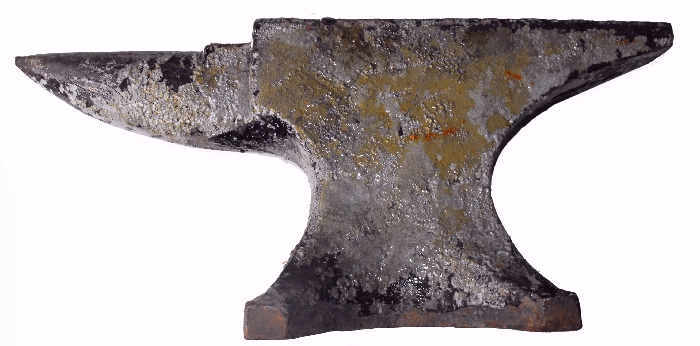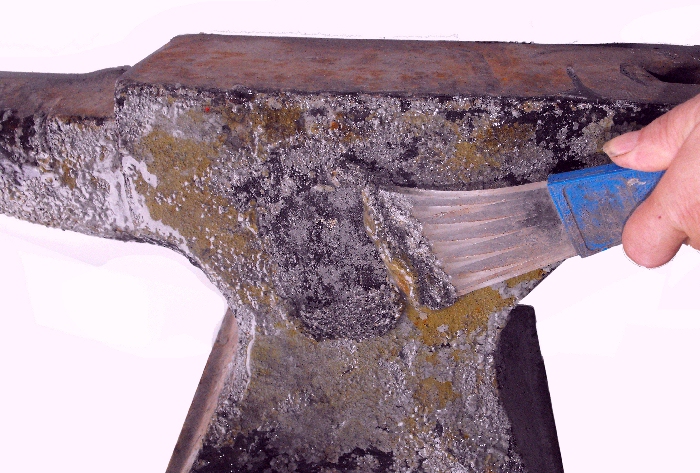
tppaper
-
Posts
5 -
Joined
-
Last visited
Content Type
Profiles
Forums
Articles
Gallery
Downloads
Events
Posts posted by tppaper
-
-
I would agree that it's probably a Peter Wright:
1. Ledges on the feet are typical for post-1850's Peter Wrights
2. Weight stamping is typical of English made anvils (i.e. Peter Wrights)
3. Other anvils with ledges on the feet are Swedish anvils and some German anvils like early Trentons. These anvils were typically stamped in pounds, not in the stone system.
4. I have several Peter Wrights with stamps on the front of the feet and down low on the side like yours.
Hello Sask Mark,
Thanks for the info. I have now examined about 100 pictures from about 40 different Peter Wright Anvils. Most were in the 84 - 195 pound range. I see almost "all" have these things in common.
1. Ledges on the Feet
2. English System Weight stampings
3. A Letter stamped below the weight
4. A small Rectangular Hole in the center front edge
5. A Number, Letter, or Symbol stamped on the front base edge
6. "Peter Wright Patent" stamped on the side above or around the weight stamping
I did find pictures of one that was 225 pounds with all features 1-5 above, but no "Peter Wright" name stamp. Is it possible that some larger anvils were not name stamped? Or perhaps some "Early" ones before "Patent" was stamped?
As you can see, we've started soaking the anvil with Zip-Strip and started to remove the old gray paint. What a mess. Later today we'll see what is underneath.

-
Thanks so much for you comments.
Would there be any point in removing the paint on the left side where the weight is stamped to see if its marked "Peter Wright"? Would this hurt the value?
Also, were anvils by him dated? -
A friend recently purchased this anvil and wants help identifying it. It is conventional shape, weighing 217 lbs. It sits on a 12"x21" steel plate, 1" thick, with steel casters - the base plate weighs 92 lbs making a total weight of 300 lbs.
Face measures 4-1/2" x 17-3/16" - Horn measures 10-1/2" - height is 12-1/4" - Base measures 10-3/4" x 11-1/2". The front right base flat has a "5" stamped into it and the left side is marked ... "1 - 3 - 21 " which we know is the weight "1x112 + 3x28 + 21" = 217 pounds.
There is also a "D" stamped near the bottom. Its about 4" directly below the center number. Does this "D" mean anything to anyone?
In this next picture is where the number "5" is stamped on the right front ledge. There is also a 1/2" x 3/4" hole about 1-1/2" deep in the middle of this front edge.
Does this manner of weight marking mean "for sure" its an English maker, perhaps Peter Wright? Some have suggested Peter Wright because of the 1/2" x 3/4" hole in the front edge.
What else should he look for to distinguish a particular makers style? Should I have him remove the gray paint, or is this enough info to identify the maker?
When it is tapped with a small hammer ... it "s i n g s" for about 5 full seconds.






Anvil ID
in Anvils, Swage Blocks, and Mandrels
Posted
We also have a William Foster Anvil. It is dated 1848. It was also "beat" to pieces with the tail broken off. And, it was also pretty cheap, costing $25. It originally weighed 94 lbs being marked 0-3-10, but now weighs only 82 lbs since the tail is missing. What's left seems to be very sound with a good "ring". We like it because its pre- Civil War and shows a lot of use. Who knows what stories it could tell? Any idea what this would be worth?